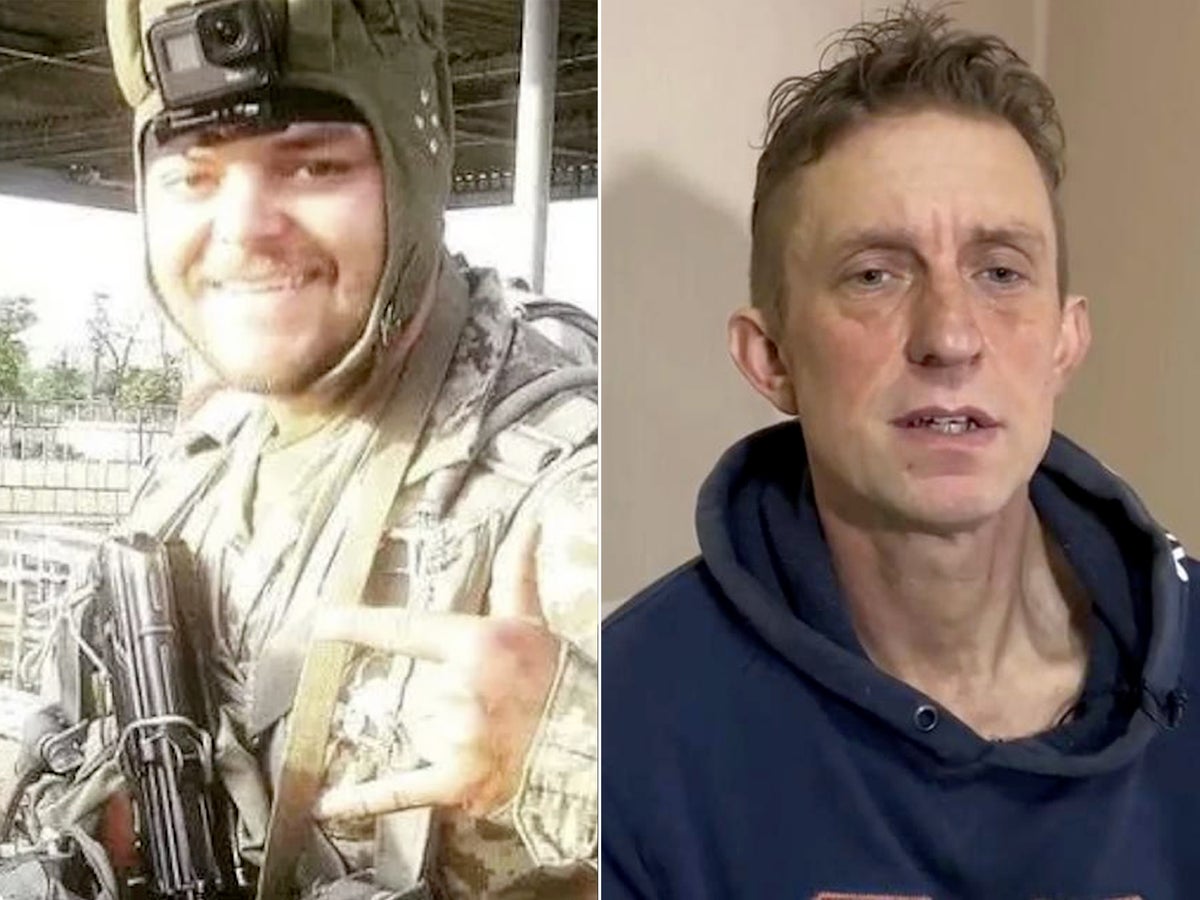
Two British men captured while fighting for Ukraine have been sentenced to death in a court in a Russian-backed separatist state.
Aiden Aslin, 28, and Shaun Pinner, 48, were tried in the so-called Donetsk People’s Republic (DPR) in what observers denounced as “a disgusting Soviet era show trial”.
They were captured in April while fighting for Ukrainian forces against Russian invaders in Mariupol.
The British men were sentenced alongside a Moroccan national, Brahim Saadoun, who reportedly had been a student studying in Kyiv before he was also detained in April. All were accused by Russia and Kremlin-backed Donetsk separatists of being “mercenaries” and sentenced to death after being accused of “terrorism”.
Speaking from behind bars, Mr Aslin said: “I was hoping the sentence would be a lot fairer judging the circumstances in which I helped the investigation and also because I surrendered to the Donetsk People’s Republic. I wish it could be different but God will be the one that will judge me when the time comes.”
Both Britons had fought for the Ukrainian army for years before Russia’s invasion and should be protected as active soldiers by the Geneva conventions on prisoners of war.
The three are set to face a firing squad and they have a month to appeal the decision, Russia’s state news agency RIA Novosti reported. All three said they will appeal the decision, according to Russian news agency Tass.
One theory is that their incarceration could be an opportunity for a bargaining tool on the part of the DPR or Moscow in order to extract concessions from London, which has been among the fiercest critics of the invasion of Ukraine.
Their sentences have been met with outrage by the UK government, with foreign secretary Liz Truss denouncing the trial as a “sham”.
Video published by RIA showed Mr Aslin, Mr Pinner, and Mr Saadoun in a courtroom cage with white bars.
Mr Pinner, from Watford, and Mr Saadoun had pleaded guilty to actions aimed at the violent seizure of power, according to the news agency.
The video appeared to show Mr Aslin, from Newark, pleading guilty to a lesser charge involving weapons and explosives.
The defendants are the “first foreign mercenaries convicted in the Donetsk People’s Republic,” the Donetsk news agency claimed.
Less than 24 hours before the verdict was handed down, Pinner and Saadoun had pleaded guilty to actions aimed at the violent seizure of power, a video shared from the court by the RIA Novosti news agency showed. Aslin appeared to have pleaded guilty to a lesser charge involving weapons and explosives.
Judge Alexander Nikulin said the verdict “was guided not only by the prescribed norms and rules, but also by the most important, unshakable principle of justice”.
The DPR is one of two breakaway Russian-backed entities in the Donbas region of eastern Ukraine that Russia says it is fighting to liberate from Ukrainian forces.
Ms Truss said: “I utterly condemn the sentencing of Aiden Aslin and Shaun Pinner held by Russian proxies in eastern Ukraine.
“They are prisoners of war. This is a sham judgment with absolutely no legitimacy.
“My thoughts are with the families. We continue to do everything we can to support them.”
Robert Jenrick, Mr Aslin’s MP in Newark, called for the Foreign Office to summon Russia’s ambassador “to account for this most egregious breach of the Geneva Convention”.
He added: “This disgusting Soviet-era style show trial is the latest reminder of the depravity of Putin’s regime.
“Russia should be clear, they cannot treat British citizens like this and get away with it.”
The Foreign Office condemned what it called the exploitation of prisoners of war for political purposes.
A spokesperson said: “They are entitled to combatant immunity and should not be prosecuted for participation in hostilities.”
No comment was immediately available from the Moroccan foreign ministry on Mr Saadoun’s case.
The trial took place in the DPR, one of two Moscow-backed separatist entities in the Donbas region of eastern Ukraine.
Three days before Russia launched its invasion on 24 February, Vladimir Putin recognised the two entities in Donbas as states independent from Ukraine – and said the conflict was to “liberate” the region.







